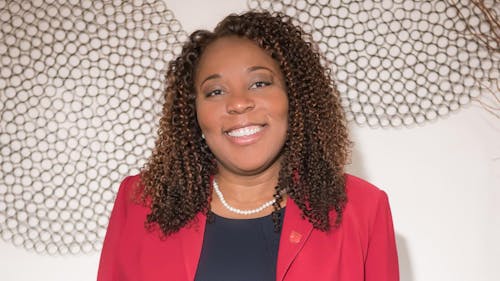Conway discusses Scarlet Guarantee, Academic Master Plan at RUSA town hall

Last Thursday, the Rutgers University Student Assembly conducted a town hall meeting with Chancellor-Provost Francine Conway to discuss changes in financial and academic resources at the University.
At the start of the meeting, she announced the Scarlet Guarantee, a new University initiative that covers tuition costs for eligible in-state students, as previously reported by The Daily Targum.
She said the students whose families earn below $65,000 a year will have all of their tuition costs covered through the Scarlet Guarantee. The program is meant to complement the state’s Garden State Guarantee tuition initiative, Conway said.
On a more personal note, she said that she has also experienced student debt and knows how pervasive of an experience it is for students at the University.
“As someone, who myself was a first-generation, underrepresented student, in many of these income brackets that we're supporting, I know how powerful education can be as a tool, as an engine, to move entire families out of poverty,” she said.
Conway then discussed the Academic Master Plan (NB-AMP), which she said has been in development since August 2021, with its steering committee meeting with undergraduates, graduate students and academic departments to identify strengths and areas for improvement at the University.
Conway said that based on the feedback the University has received, the plan was made to encompass four pillars: scholarship, innovative research, community engagement and student success.
She said the NB-AMP is meant to address the changing student expectations after the coronavirus disease (COVID-19) pandemic, such as more hybrid course options and parity in quality for both online and in-person courses.
“One of the reasons why I hold the staff and faculty together to complete the Academic Master Plan is that, especially now with the pandemic and our response, we have different, transformed student expectations,” she said. “We cannot go back.”
Conway said the plan’s development process included discussions about centralizing Rutgers resources so that students can avoid issues such as being unable to complete academic requirements or pay University bills.
Carolyn Moehling, vice provost of undergraduate education, said the plan prioritizes students' ability to navigate through Rutgers by encouraging more coordination between advisors of different schools, aiding transfer students’ transition to Rutgers and consolidating information about experiential learning programs.
Conway said the plan also takes into account the mental health challenges that students, faculty and staff have faced during the pandemic by creating Scarlet Well. She said the initiative will consolidate the University's resources and use a public health lens to treat wellness issues.
“So it's not just the individuals that are tasked with responding to our students' emotional needs, psychological needs, wellness needs, nutritional needs, but it has to permeate through the staff, and it has to permeate through the faculty,” Conway said.
When asked about how the University can encourage students to take classes outside of their degree, she said that she wants to use the NB-AMP to develop more interdisciplinary experiences so that students can learn outside their area of study as well as support faculty in innovating new academic curriculums.
Conway said that the full text of the plan will be available to the Rutgers community by the end of April. Additionally, after publishing the NB-AMP, she said she will be issuing the Chancellor-Provost Challenge, in which students from diverse academic backgrounds can propose initiatives that will benefit the campus and that the University can financially support.
With regard to the expansion of merit scholarships, Conway said that prior to this year, if a student had a merit-based scholarship and wanted to transfer between schools, they would lose their funding.
She said that this year, she would be working with school deans to start centralizing merit-based funding so that students would not lose their scholarships if they changed their school or major.
Conway also said that the funds for the Scarlet Guarantee will not cut into existing merit scholarships or aid.
“Some of this will be a heavy lift in that it's changing the way we conduct business, and that is necessary,” she said. “I say ‘let me do something,’ and it is up to you to hold me to it and say ‘hey, what are you doing about this?’ ... I'm going to count on you to do that.”



